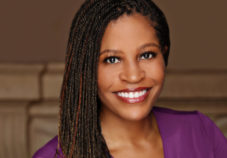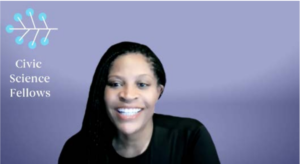
Jylana L. Sheats
Title
Aspen Institute Civic Science Fellow
Year
2021
Project focus: Jylana will co-design and co-manage the “Our Future is Science” initiative in close partnership with the Aspen Institute and Coda Societies to spark passion, confidence, and curiosity about science for highschool-aged Black, Indigenous, and People of Color (BIPOC).
About Jylana
Jylana L. Sheats, Ph.D., MPH, is a behavior scientist with advanced training in public health and behavioral medicine. A researcher, practitioner, educator, and thought leader, Jylana has designed a career where she provides cross-sector guidance on the science and design of health behavior change solutions; equitable community engagement and participatory approaches; inclusive science communication; social innovation; and STEAM diversity. She was a 2021–23 Civic Science Fellow with the Aspen Institute Science & Society Program. Committed to advancing science and equipping the next generation of scientists, healthcare/ public health practitioners, and scholars, Jylana is a Clinical Associate Professor at Tulane University School of Public Health and Tropical Medicine; and Associate Director of the Aspen Institute Science and Society Program. Well-published and an international speaker, Jylana’s individual and collaborative efforts have been documented via book chapters, peer-reviewed articles, and new media. Her professional efforts have been recognized via receipt of research honors and awards such as the Dr. Tony A. Mobley International Distinguished Alumni Award from Indiana University–Bloomington’s School of Public Health; a National Institutes of Health’s Building Research Careers in Women’s Health award; an NIH Obesity and Health Disparities Programs to Increase Diversity Among Individuals Engaged in Health-Related Research (PRIDE) award; and multiple Inspire leadership awards in her capacity as a former corporate behavior scientist at Johnson & Johnson. A graduate of Spelman College, Jylana also has degrees from Tulane University School of Public Health and Tropical Medicine and Indiana University–Bloomington. She completed her postdoctoral training in behavioral medicine at Stanford School of Medicine.
PROGRAM WEBSITE—OUR FUTURE IS SCIENCE:
HTTPS://OURFUTUREISSCIENCE.ORG/
CIVIC SCIENCE SPARKS:
HTTPS://CIVICSCIENCEFELLOWS.ORG/STORIES/CIVIC-SCIENCE-SPARKS-WITH-THE-ASPEN-INSTITUTEAND-CODA-SOCIETIES/
DISMANTLING THE SILOS:
HTTPS://WWW.ASPENINSTITUTE.ORG/BLOG-POSTS/DISMANTLING-THE-SILOS/
ONE HEALTH / ONE PLANET DIGITAL MAGAZINE (CO-EDITOR):
HTTPS://ONLINE.FLIPPINGBOOK.COM/VIEW/773676266/
DISCOVER DISCOVERY:
HTTPS://DISCOVERDISCOVERY.COM/
FRANK 2022 TALK—WHY LIVED EXPERIENCE MATTERS:
HTTPS://VIMEO.COM/685937438
NATIONAL ACADEMIES PANEL—BUILDING A CULTURE OF CIVIC SCIENCE AT THE NATIONAL ACADEMIES SCIENCE COMMUNICATION COLLOQUIUM:
HTTPS://CIVICSCIENCEFELLOWS.ORG/STORIES/BUILDING-A-CULTURE-OF-CIVIC-SCIENCE-NAS-2022/
COMMUNICATION & STORYTELLING PART I: CIVIC SCIENCE FELLOWS MARTINA EFEYINI & DR. JYLANA L. SHEATS:
HTTPS://WWW.YOUTUBE.COM/WATCH?V=K77KPHHPDLY
COMMUNICATION & STORYTELLING PART II: CIVIC SCIENCE FELLOWS MARTINA EFEYINI & DR. JYLANA L. SHEATS:
HTTPS://WWW.YOUTUBE.COM/WATCH?V=EOKKBIZDNNI
OTHER ASPEN WORK COMPLETED DURING THE FELLOWSHIP:
IN FAVOR OF PURE SCIENCE REPORT
HTTPS://WWW.ASPENINSTITUTE.ORG/WP-CONTENT/UPLOADS/2022/09/PURE-SCIENCEASPEN-INSTITUTE-2022.PDF
A BLUEPRINT FOR EQUITABLE AI:
HTTPS://WWW.ASPENINSTITUTE.ORG/PUBLICATIONS/BLUEPRINT-FOR-EQUITABLE-AI/
CLINICAL TRIAL DIVERSITY: ADVANCING SCIENTIFIC DISCOVERY AND EQUITY (FORTHCOMING)
RELEVANT WORK COMPLETED DURING THE FELLOWSHIP:
OUR VOICE NOLA: LEVERAGING A COMMUNITY ENGAGED CITIZEN SCIENCE METHOD TO CONTEXTUALIZE THE NEW ORLEANS FOOD ENVIRONMENT:
HTTPS://WWW.MDPI.COM/1660-4601/19/22/14790
CLIMATE CHANGE & YOUTH MENTAL HEALTH
HTTPS://SEECHANGEINSTITUTE.COM/SCI_PROJECT/CLIMATECHANGEANDYOUTHMENTALHEALTH/
1. What was the focus of your work as a Civic Science Fellow? What did you do?
As a Civic Science Fellow, I played a key role in designing Our Future is Science (OFIS), an initiative of the Aspen Institute Science and Society program, which was my host institution, and Coda Societies. The initiative is composed of a near-peer leadership mentorship forum and an educational campaign that both centers on connecting science and social justice. The idea for OFIS was born out of the need to address many of the well-documented barriers to STEM for underserved, historically marginalized, rural and low-income students. Our team has created a mechanism that draws upon students’ cultural funds of knowledge to develop deep and meaningful linkages between STEM, their lived experiences, and social justice. With regard to the mentorship forum, we pair high schooler mentees from across the U.S. with graduate STEM student mentors—also across the U.S. To date, we’ve had over 500 students apply to the program—and accepted 110 students across our two cohorts. As part of the program, we designed a STEM-social justice modular curriculum implemented by the mentors in their bi-weekly mentorship team meetings, hosted monthly professional development workshops, as well as a monthly community talk series where we feature scientists from an underrepresented race or ethnicity and an activist or someone in a science-adjacent career who are both working at the intersection of science and a social justice issue—but in different, yet complimentary ways. The community talks are open to the public, our program alumni, whom we call Ambassadors, and Scholars, who are students that applied to OFIS, but are unable to fully participate due to programmatic capacity. To reach the masses, we have an educational campaign that asks students from across the U.S. to respond, by video, to the prompt: how could science solve a problem in your community? This campaign runs about two times per year and with each iteration, we’ve awarded the most creative, compelling, and innovative ideas with cash prizes and scholarships.
2. How do you hope your work as a Fellow will influence the future—for yourself, an organization, a community, or a field?
I am excited for Our Future is Science to continue inspiring and equipping the next generation of STEM leaders with knowledge and ability to use science as a tool to address social justice issues. We are all intersectional beings with each young person in our OFIS network—whether a mentor, mentee, Ambassador, or Scholar, being equipped with the knowledge, skills, and abilities to speak confidently about the connections between science and social justice and act in a way that leads to societal change.
3. What’s one insight you’d share from your work as a Civic Science Fellow? When I accepted the invitation to be a Civic Science Fellow, I made a personal vow to fully immerse myself in the position, engage in or lead opportunities that were afforded to us, and maintain a growth mindset—even when experiencing challenges. I can confidently say that I have accomplished my goal and want to continue on this trajectory as I am a better person for it. I encourage future fellows to do the same.
Video (click for link):
